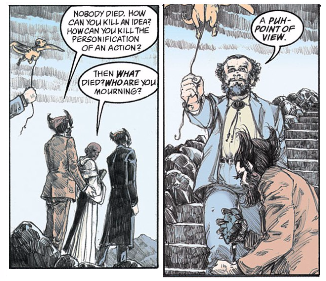So, while dealing with being sick and the need to be sitting upright at times when I would rather have been laying down sleeping, I wound up playing a lot of the comic sci-fi FPS game Borderlands. This is a game I’ve played through multiple times with multiple characters, so it can be fairly relaxing, even meditative, when I need something engaging enough to distract me but that won’t take a lot of energy or mental effort.
A side effect of playing a FPS (that’s first person shooter, for those not hep to the modern lingo) right before falling asleep is I had dreams that were from a first-person perspective. The first thing I thought when I woke up was, “Well, that was weird.”
The second thing I thought was: why was it?
After all, I live my life from a first-person perspective. I do not see my body from an outside perspective. I do not watch myself perform things from a distance. When I want to pick up a can of soda and drink from it, I am extending my own arm, guided only by what is visible in my field of view and a peripheral awareness of my arm’s existence and position.
Everything I see is from a first person perspective. Even if I look at a picture of myself, or see myself reflected in a mirror or window, or play a video game that uses a third-person perspective and watch a little figure respond to the movements of my fingers, I am seeing it from a first person perspective.
But I am used to seeing myself in dreams, or someone who somehow represents myself. When I imagine myself doing something, whether it’s the kind of elaborate fantasy that fuels my writing and roleplaying or something as simple and mundane as imagining interacting with a clerk at the DMV so I can psych myself up for it, I tend to imagine it from the sort of point of view that movies, TV shows, comic books, and (many) video games have made so familiar and accessible to me: the third person.
Since I had this realization, I’ve tried—at first, mostly just as an exercise in curiosity—to shift my inner life from that of a cameraman to that of a person. When I imagine myself doing something or rehearse something in my head, I imagine what I will see looking out through my own two eyes. When I’m imagining a character in a situation, I try to imagine it through their eyes, literally as well as metaphorically. It’s not something I can do consistently yet, and maybe not very well, but I think it’s actually doing something for my confidence and follow-through when I think of things like… well, when I conceive of “writing” from the viewpoint of the screen in front of me and a keyboard just visible on my lap, rather than a doubtlessly inaccurate and detached view of myself sitting in a chair in front of a computer.
I don’t know if this will be any kind of great epiphany for most people. I don’t know what percentage of people imagine themselves in the third person what percentage of the time.
In addition to changing how I think about myself when I’m imagining something, I’ve also started just noticing myself from a first-person point of view. People I trust—friends, family, random articles on the internet—have been talking to me about “mindfulness”, but other than things like being aware of my breathing (which I usually am) and sometimes taking a moment to reflect on how I’m feeling, I’ve never quite acquired the knack of it in any larger or deeper sense.
But now I’ll be walking down a hallway, or sitting in a corner, and I’ll think about what I can see, where my hands are, what my legs are doing… not in a “OH GEEZ WHAT ARE MY LEGS DOING NOW?” sense, just “This is what’s happening. This is where I am. This is what it looks like to me when I am in this place, doing this thing.”
And while it might seem like this kind of self-awareness would lead to self-consciously, but the opposite has been true. I find myself moving more smoothly and fluidly through the world I live in. with the same kind of facility I can slide around corners on the alien world of Pandora when I’m playing Borderlands.
It’s interesting. Growing up trans, and coping with everything that comes with that as a young adult, I sort of divorced myself from my body. I stopped thinking of what I have—my body—as me, as what I am. But I never really found anything to replace that.
If I am not a body, what am I? A soul, a mind? What are those? A consciousness? That’s so nebulous. And yet, when I’m trying to explain the qualitative concept of consciousness to someone who’s never pondered it, the first thing I settle on is asking them to think about their field of vision. If a brain really was just a series of physical interactions, chemical dominoes knocking each other over in response to stimuli, the human body that is recognized as you would behave exactly the way you do in response to anything that happens within your field of awareness, but would that field of awareness exist?
Note that I don’t want to bog down this post with a discussion of philosophical zombies, so please treat the questions in the previous paragraph as rhetorical. The point here is that for questions like “What am I that is more than a body? What does my existence add to the world? What will be lost when I’m gone?”, maybe the best answer is “A perspective.”
Or as The Sandman put it, so many years ago now:

